Welcome to the August 11, 2023 issue of Cotton News, a service provided by Plains Cotton Growers Inc. for the cotton industry in the Texas High Plains and beyond.
Correction: in the “Cotton News” newsletter sent out Friday, August 11, it said Texas Upland cotton yield was projected to be 773 pounds per acre. That number should have been 517 for Texas yield, as 773 pounds pertains to the U.S. estimate. We apologize for the confusion.
Cotton Foundation Educational Outreach Tour Visits West Texas
One of the greatest things about fulfilling the promotion pillar of the Plains Cotton Growers mission is the knowledge that there is humanity in everyone. We have ideas of agencies and organizations, but rarely understand the people behind them until we exchange viewpoints.
The Cotton Foundation Educational Outreach Tour brought 11 individuals — nine from the Environmental Protection Agency, one from the U.S. Fish and Wildlife Service and one from the U.S. Department of Agriculture Office of Pest Management — to West Texas to learn more about cotton production here, specifically chemical application and needs of the producers in this area.
There were seven stops made on the High Plains leg of the tour. Click on the tabs below to learn more.
First Stop: PCG Office - Texas Cotton Production and Research Conducted on the Texas High Plains
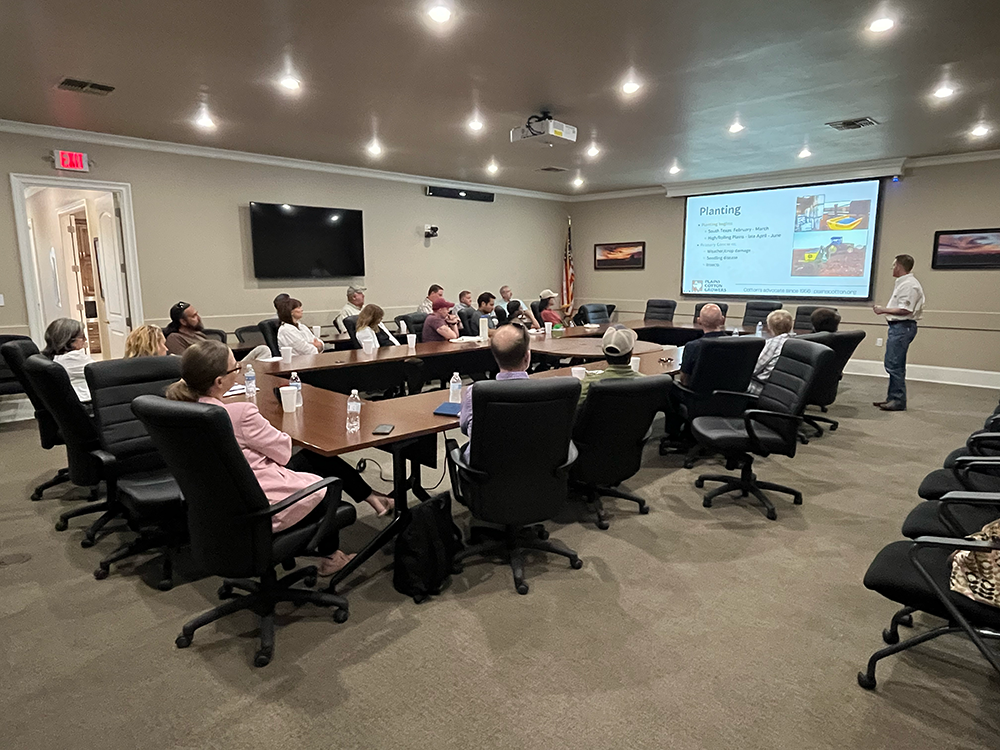
FIRST STOP: Plains Cotton Growers Inc.
PCG CEO Kody Bessent provides an overview of cotton production on the Texas High Plains. The group was very interested in learning more about planting decisions and treated seed. Lubbock County Producer Rex Kennedy was able to give them an idea of what goes into these decisions from a business owner standpoint by explaining the technology in the seed has increased the value. “Decisions are made differently now,” he added. “We used to plant per pound and now we plant by plant population, which influences our economic decisions.
“Technology gives us better yields, no doubt; but there is a cost to that.”
Jane Dever, Ph.D., cotton breeding geneticist and professor/researcher for Texas A&M University AgriLife provided an overview of the research conducted to better meet the needs of producers in this climate. The group was able to see a variety developed by Dever on Jeremy Brown’s farm the following day.
Second Stop: Burt Heinrich Farm
SECOND STOP: Heinrich Farms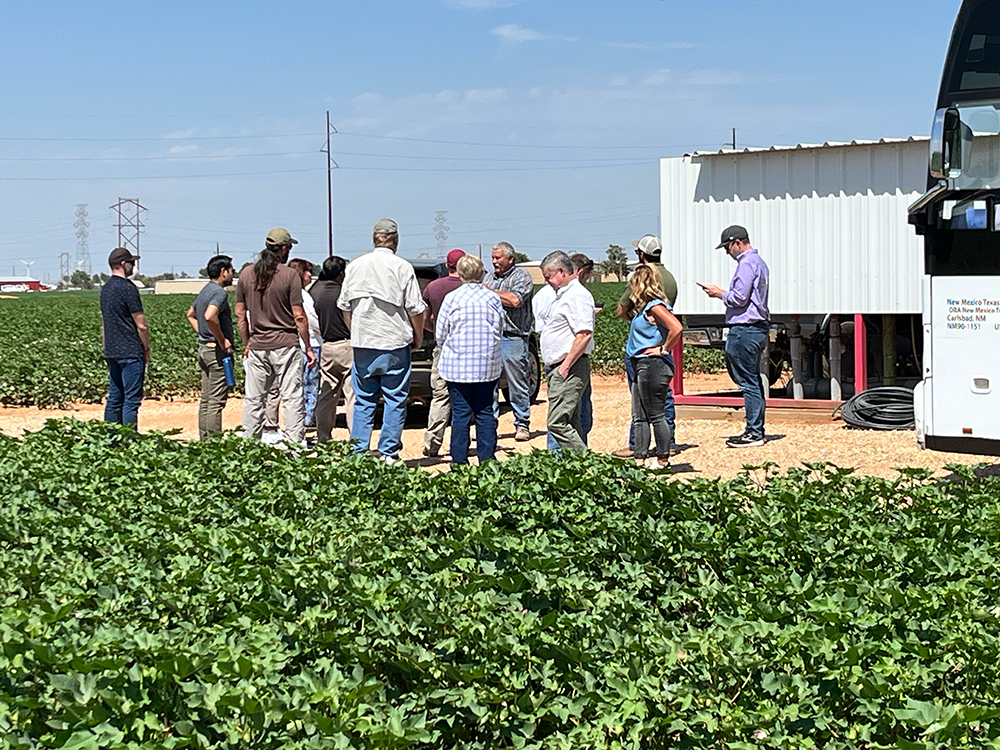
Lubbock County Producer Burt Heinrich provided an overview of drip irrigation. When it comes to spraying pesticides, he mentioned he’d rather not spray insecticide at all. “I want to protect my ladies (ladybugs, beneficials), so we work hard to prevent any need to spray. If the beneficials take care of it, we don’t have to.”
Heinrich also discussed the challenges of urban sprawl and farming. “Having a bug war in the city doesn’t work,” he added.
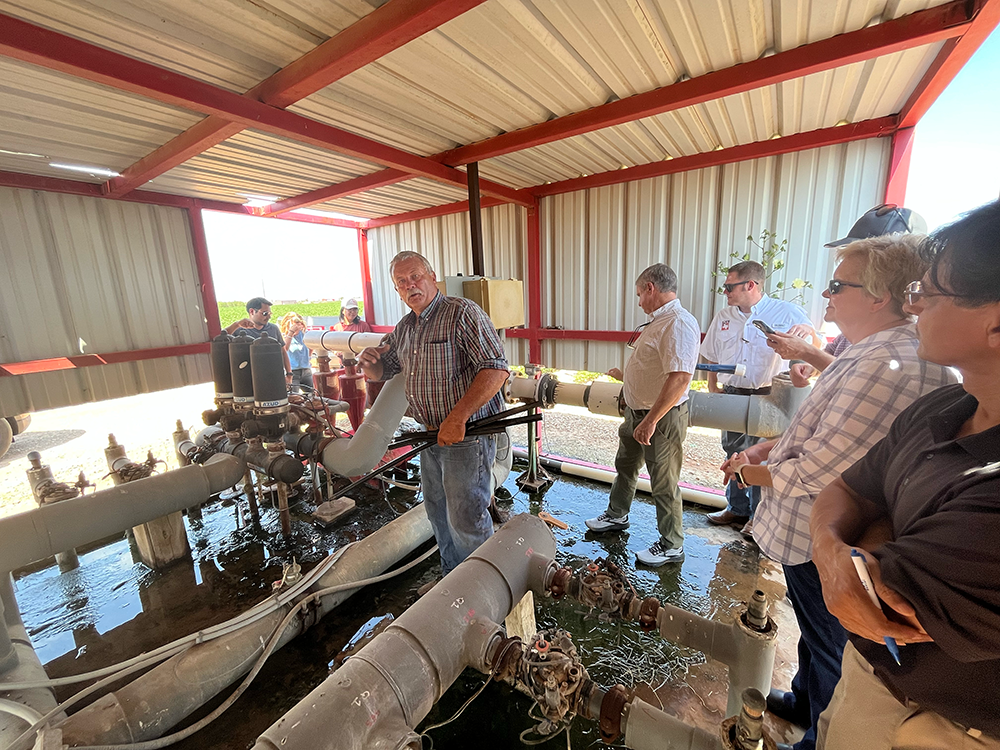
Heinrich explains drip irrigation to the Cotton Foundation Educational Outreach Tour participants.
Third Stop: Yoakum Dunes Wildlife Management Area
THIRD STOP: Yoakum Dunes Wildlife Management Area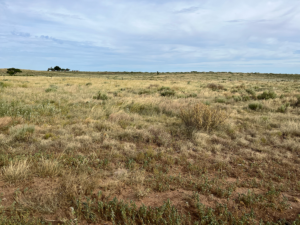
The Texas Parks and Wildlife Commission approved acceptance of land donation to create the new 14,037-acre Yoakum Dunes Wildlife Management Area (WMA) in Cochran, Terry and Yoakum counties in 2014. Today the acreage is closer to 16,000. The WMA’s mission is to provide refuge for the threatened lesser prairie chicken and other native grassland birds and wildlife.
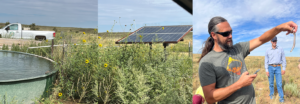
The WMA adds two to three solar wells per year. The goal is to have one water source per mile to keep uniform grazing when using livestock on the land. While walking on the land, the group found a hog-nosed snake. Some admired from up close and some stayed a safe distance away!
Kelton Mote, Yoakum Dunes WMA biologist, gave some opening remarks on the refuge site. “One thing we know about lesser prairie chickens is they don’t like vertical structure so we try to keep mesquite trees out of the land and we do manage shin oak in this area as well so it doesn’t get too tall.” When asked why the lesser prairie chicken doesn’t like vertical structure, Mote said, “We believe it’s because of predators like the raptor. Anytime they see something taller than four feet, they think it’s a raptor roost.”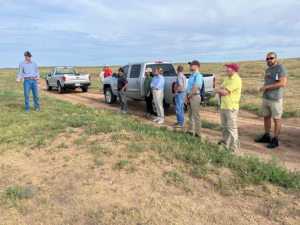
He also said the lesser prairie chicken, like other ground nesting birds, has a shorter life span than other birds. Eggs are easily taken out of nests when there is a drought. “These birds need cover, so when it’s really dry, they don’t have what they need to survive.”
From chick to adult, the lesser prairie chicken lasts about six months, Mote added, making it harder to keep population numbers up. But more than anything, this bird is heavily affected by drought.
In 2021, Mote counted 100 lesser prairie chickens on the WMA. In 2022, after a very dry year, he counted 50. This year was the same. “We’re optimistic because we’ve maintained that number for two years with really dry seasons — we haven’t lost more from 2022 to 2023.”
Fourth Stop: Jeremy Brown Farm
FOURTH STOP: Jeremy Brown Farm in Dawson County
Brown showed the group one of his wide-row, irrigated organic cotton farms. “You’ll actually find the majority of organic cotton produced in this region because of our climate,” he said.
Brown uses shallow tillage to help control weeds and the only fertilizer he uses are from livestock when they graze the land. “I am a big believer in soil health and regenerative farming. I want to take care of the land God has blessed me with,” Brown said.
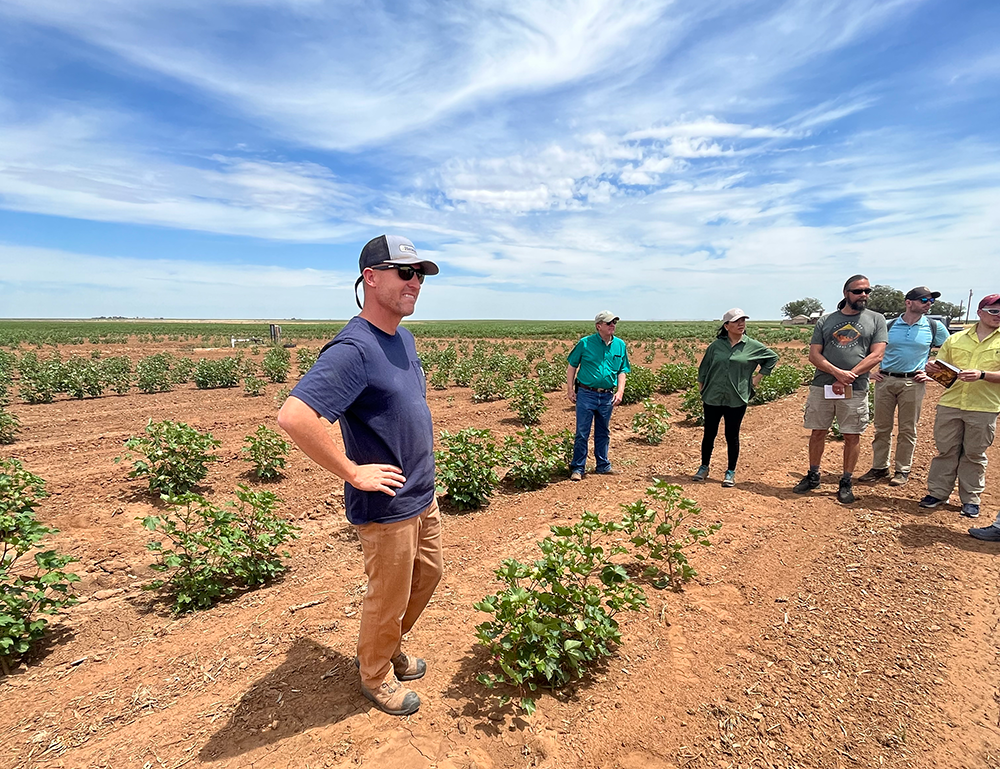
Fifth Stop: Shawn Holladay Farm in Dawson County
FIFTH STOP: Shawn Holladay’s Farm in Dawson County
To illustrate responsible herbicide application, Holladay took the group to a conventional cotton field surrounded by dicamba-traited cotton. He had sprayed right up to the conventional rows and didn’t kill the non-dicamba cotton.
Just about every producer the group visited with on this leg of the tour stressed the fact that they didn’t want to spray fields for weeds or pests if they didn’t have to. “That’s money out of my profit,” said Shawn Holladay. “If I have to spray, I want to make sure that all conditions are right otherwise I’m throwing money away.”
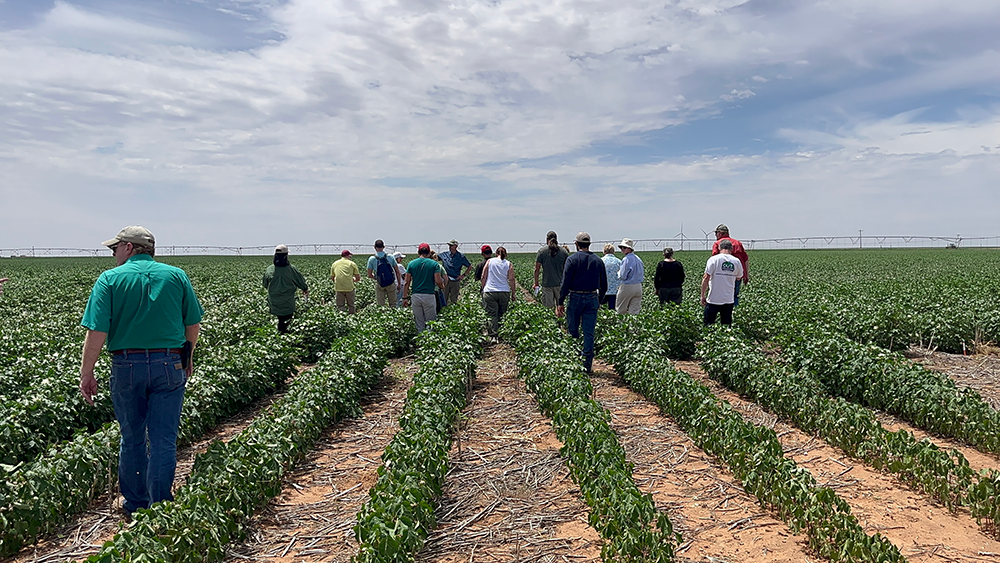
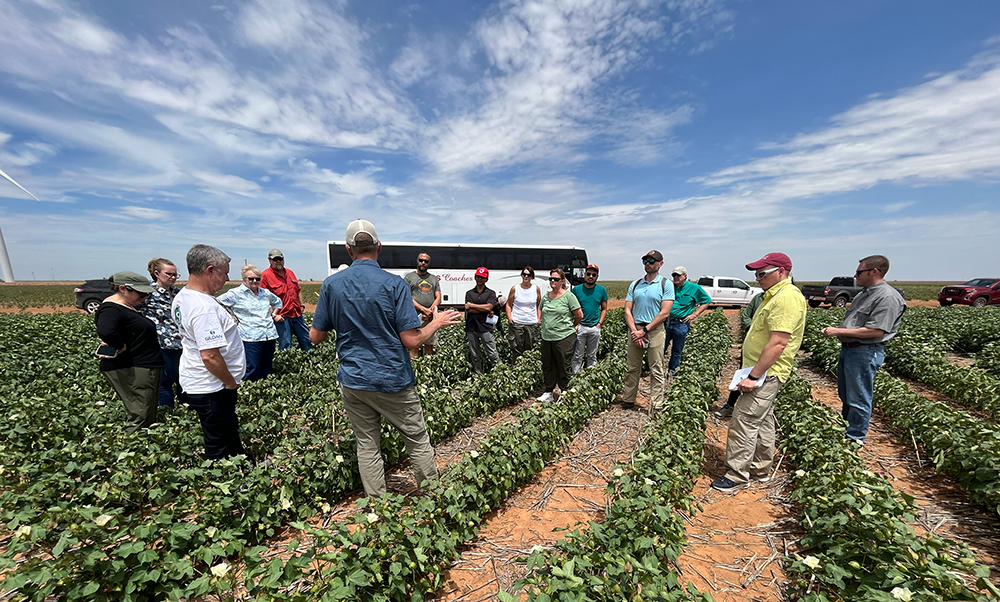
Sixth Stop: Meadow Farmers Co-op Gin
SIXTH STOP: Meadow Farmers Co-op Gin
To further illustrate cotton production in the area, the tour stopped at Meadow Farmers Co-op Gin where manager Dan Jackson walked them through the ginning process.
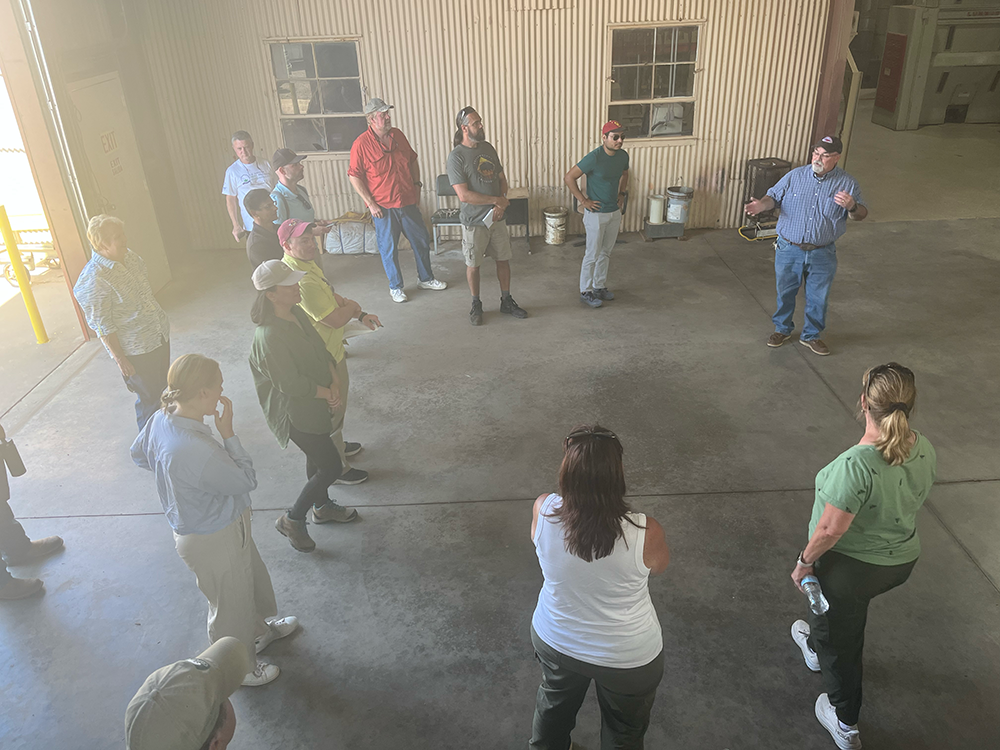
Seventh Stop: Bayer Lubbock Texas Cottonseed Manufacturing Site
SEVENTH STOP: Bayer Lubbock Texas Cottonseed Manufacturing Site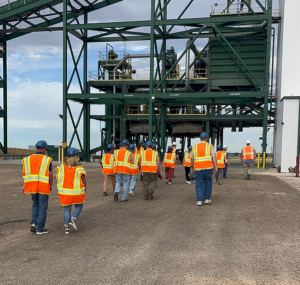
As closing remarks were made before the group got back on the bus to head toward Sweetwater for the next leg of their tour, they were grateful for the producers and organization leadership who answered many questions over the last couple of days.
“We greatly appreciate you taking time away from your family and colleagues to come and learn about West Texas cotton production. We welcome your questions,” said Kody Bessent, PCG CEO. “We’re happy to answer as many as you want to ask. We may not always agree on the solutions to the questions that you are tasked with addressing as agency officials; however, we will always be an honest resource with you and never shy away from the conversation and how we can create solutions together.”
Farm Bill Listening Session Scheduled in Canyon
Congressman Jackson and Arrington would like to officially invite you to participate in a farm bill listening session in Canyon, Texas. With the farm bill deadline quickly approaching, this listening session will give you and your members the opportunity to discuss your priorities for this year’s farm bill.
The listening session details:
WHEN: Wednesday, August 16 from 5-6:30 PM
WHERE: West Texas A&M Piehl-Schaeffer Pavilion (600 WTAMU Dr. Canyon, TX 79015)
RSVP: Please call the office at 806-792-4904 if you’d like to RSVP to the event.
WTACI Schedules 71st Annual Meeting
The West Texas Agricultural Chemicals Institute will host their annual conference on Thursday, September 14, at the Scottish Rite Event Center, located at 1101 70th Street in Lubbock.
This year represents the 71st meeting of WTACI, an unincorporated organization of dealers, industry representatives, agricultural producers, scientists, educators, and agribusiness members who support education and research programs promoting safe and effective use of agricultural chemicals and protection and preservation of the area’s natural resources.
Topics to be discussed at the conference include:
- Weed control in herbicide-tolerant sorghum;
- New chemistries for weed and brush control in range and pasture;
- Endangered Species Act overview;
- Beltwide cotton IPM research focus;
- Semi-arid Agricultural Systems Institute research update; and
- Australia cotton production overview compared to West Texas cotton production.
A total of 7 Texas Department of Agriculture (TDA) CEUs will be available.
Pre-registration is available online. On-line registration fees are $75 for conference attendees and must be completed by September 8. Booth fees start at $300. On-site registration will begin at 7:30 a.m. the day of the conference and will cost $95 for attendees and $325 for booth sponsors. Lunch will be provided as part of the registration fee.